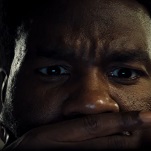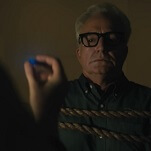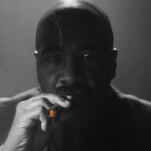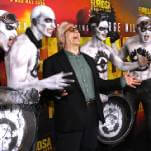Star Trek: Deep Space Nine: "Waltz"/"Who Mourns For Morn?"

“Waltz” (season 6, episode 11; originally aired 1/8/1998)
In which Dukat and Sisko dance, but Dukat finds other partners…
(Available on Netflix, Hulu, and Amazon.)
How do you solve a problem like Gul Dukat? Former Gul Dukat, actually; I doubt he still retains his position post breakdown and capture. (Maybe he does. I’m not an expert on Cardassian bureaucracy/power structures.) But the point isn’t his title: the point is figuring out what to do with a character who’s had the most dramatic rises and falls of anyone on the series. Dukat has been a commandant, an officiant, a father bent on murder, a revolutionary, a dictator, and, lately, a man with a broken mind, tormented by the simultaneous loss of his daughter (who, let’s remember, he was once determined to kill) and his thorough beating at the hands of anti-Dominion forces. When we meet him at the start of “Waltz,” after a long introductory voice-over from Sisko explaining the current situation—Dukat’s been in therapy, and is now heading to the Federation for some preliminary legal proceedings—he seems well enough. But over the course of the hour, we learn that Dukat is a deeply damaged individual, fractured and tormented in ways that are very likely irreparable. After spending time with the Cardassian under unusual circumstances, Sisko draws certain conclusions, solving Dukat as neatly as Alexander solved a certain knot: the enemy is an evil man, and Sisko is determined to stop him.
While there’s no question Dukat has evil in him, I’m not sure I agree with Sisko’s line in the sand pronouncement. It makes sense from a character perspective; Sisko is a smart, determined fighter, but he’s always been more warrior than philosopher, and in situations where something he cares about is threatened, he’s not going to quibble too much about details. Sisko reacts to crises emotionally as much as intellectually, and that passion typically serves him well. His decision here, after seeing Dukat rant and rave for days before swearing to destroy all that Bajor is, is the sort of decision that DS9 handles better than any other Trek series before it: an in-character beat that is perfectly satisfying (if maybe a little over-the-top), but that doesn’t necessarily line up with our own view of the situation. Dukat doesn’t come across well in “Waltz,” and his final speech is a few screams shy of a Batman villain rant, but the fact that we get to see the demons he’s fighting against make him more complex than Sisko’s determination allows. The final shot of Dukat as he closes the shuttle’s rear door, with the trio of phantasms crowded behind him, is telling. He is a man haunted by his crimes, but incapable of understanding what’s haunting him. The only response left is to double down on villainy, and while it’s necessary to condemn such a choice, I find it hard not have some pity for the fool who makes it.
“Waltz” is a tricky episode, using a set-up that we’ve seen before—namely, characters alone together in less than ideal circumstances (it’s sort of what happened with Kira and Dukat in “Indiscretion”)—and a gimmick with a high chance of failure, ie “let’s visualize my madness through the power of imaginary people.” There are plenty of ways this could’ve gone wrong, and the crazed intensity of so much Marc Alaimo’s performance throughout regularly borders on camp, but it works. This is playing-at-the-edges stuff, trying to understand what drives Dukat without softening him or making that understanding too simplistic. Having phantom versions of Weyoun, Damar, and Kira appear at various times to allow Dukat’s inner turmoil external expression is a clever idea, but not an automatically effective one. At times, it threatens to make the various crises he’s struggling with too obvious. Weyoun appearing in a scene the first time we see Dukat alone is a heck of a shock, but once it’s clear that he’s just an imaginary friend (albeit one Dukat doesn’t realize is imaginary), his presence loses much of its impact. Weyoun and the others can’t effect events; they can only inform us of Dukat’s character, like how Dukat has doubts about whether or not he should keep Sisko alive, and how he also judges himself harshly for his failures. All of which is good information to have, but doesn’t in and of itself justify the gimmick.
What makes Dukat’s hallucinations work, I think, is how they build. Individually, Weyoun, Damar, and Kira are entertaining but unnecessary. Weyoun is Dukat’s loathing of his “weaker” self, while Damar is Dukat’s Cardassian pride speaking out; Kira is his complicated relationship with Bajor, manifesting both as a symbol of what he can never have, and proof that his enemy was always looking to misinterpret his actions to serve their own needs. They give the script a way to illuminate Dukat’s mind without resorting to simple monologues, but it’s such an obvious device that it’s a little distracting to watch. But once the figures start popping up while Dukat is arguing his case with Sisko, things get interesting. While the episode is often ostensibly through Dukat’s eyes (after all, we can see things that he sees, even when Sisko can’t), the primary tension comes from figuring out just why the Cardassian was willing to save his off-and-on nemesis, and what that decision means for Sisko’s immediate future. As Dukat’s desperation to win an ideological discussion with Sisko intensifies, the harbingers of his madness grow stronger; we’re privy to the interjections from Dukat’s psyche, but Sisko is not, which creates a fascinating, and unsettling, back and forth.
So why does Dukat save Sisko? He does it more than once, first saving his enemy when the ship they’re in is attacked, and then building Sisko a cast for his broken arm (Dukat claims he can’t use the bone regenerator device, which could very well be true; it could also be true that he wants to keep his edge). At the end of the episode, Sisko briefly gets an advantage over Dukat, only for the Cardassian to tackle him and beat him before fleeing in a shuttle. Dukat’s behavior in those final moments is, if anything, even stranger; before there was a sense that he was trying, in his fundamentally broken way, to justify himself, but his final speech is a declaration of war and he still lets Sisko live. (He even contacts the Defiant to let them know where the captain is.) Admittedly, Sisko has to live; between the two, Dukat is the only potentially expendable one, and it seems the writers still have stories they want to tell about him. But there’s also a decent in-story reason for why Sisko doesn’t die, and it’s something that works to keep this more complicated than a simple bad-guy-takes-good-guy-hostage scenario.
Ostensibly the conflict of the episode comes from Sisko’s attempts to contact a rescue ship, attempts which are first stymied by Dukat sabotaging the emergency beacon (I love the fake out when we think the Defiant finally got the signal; I also love how visibly disappointed everyone is when they beam two survivors aboard who aren’t Sisko), and then by Dukat’s decision to vaporize the beacon entirely. But while this conflict makes for solid suspense, it’s not really the heart of “Waltz.” The heart is Dukat’s increasingly deranged attempts to convince Sisko of his righteousness, attempts which ultimately only serve to push the two characters even further apart. These attempts fit in well with what we know of Dukat from the past, a man who once told Weyoun that the most important victory was in beating your enemies so thoroughly that they are forced to admit your inherent superiority. Something in him can’t just be satisfied with winning, the way, say, Damar would be satisfied. He needs to be acknowledged.
This is an odd quirk to have, although (credit to the writers and Marc Alaimo, who is never short of excellent) it’s one that always makes sense even if it’s difficult to grasp where it’s coming from. If Dukat really is a psychopath through and through, it’s curious that he would so desperately need the reassurance of others that he wasn’t. It’s especially curious that the people he turns to for that assurance—Sisko in this episode, Kira in the past (yes, he’s romantically interested in her, but a large part of the attraction comes from how much she loathes him; seducing her would be just another way of proving his point)—are the people least likely to accept his overtures.







































